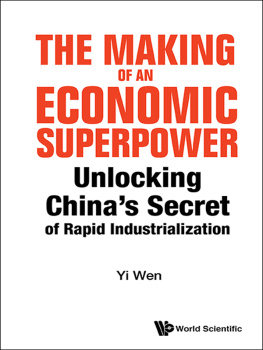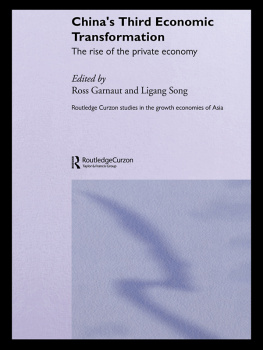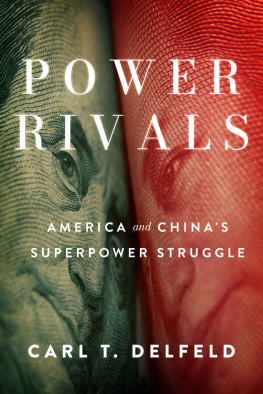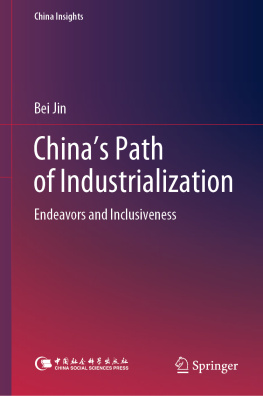

Published by
World Scientific Publishing Co. Pte. Ltd.
5 Toh Tuck Link, Singapore 596224
USA office: 27 Warren Street, Suite 401-402, Hackensack, NJ 07601
UK office: 57 Shelton Street, Covent Garden, London WC2H 9HE
Library of Congress Cataloging-in-Publication Data
Names: Wen, Yi, author.
Title: The making of an economic superpower : unlocking Chinas secret of rapid industrialization /
Yi Wen (Federal Reserve Bank of St. Louis, USA & Tsinghua University, China).
Description: New Jersey : World Scientific, 2016. | Includes bibliographical references and index.
Identifiers: LCCN 2015048899 | ISBN 9789814733724 (hc : alk. paper)
Subjects: LCSH: Industrial policy--China. | China-Economic policy. |
Economic development--China.
Classification: LCC HD3616.C63 W46 2016 | DDC 338.951--dc23
LC record available at http://lccn.loc.gov/2015048899
British Library Cataloguing-in-Publication Data
A catalogue record for this book is available from the British Library.
Copyright 2016 by World Scientific Publishing Co. Pte. Ltd.
All rights reserved. This book, or parts thereof, may not be reproduced in any form or by any means, electronic or mechanical, including photocopying, recording or any information storage and retrieval system now known or to be invented, without written permission from the publisher.
For photocopying of material in this volume, please pay a copying fee through the Copyright Clearance Center, Inc., 222 Rosewood Drive, Danvers, MA 01923, USA. In this case permission to photocopy is not required from the publisher.
Desk Editors: Harini Lakshmi Narasimhan/Dong Lixi
Typeset by Stallion Press
Email:
Printed in Singapore
For JIN Baoli (

) and WEN You Ricardo (

), with love
About the Author
Yi Wen
Research Division, Federal Reserve Bank of St. Louis, USA
&
School of Economics & Management, Tsinghua University, China
The author is a senior economist and assistant Vice President in the Research Department of the Federal Reserve Bank of St. Louis and CCB Chair Professor in the School of Economics and Management (SEM) of Tsinghua University. The views expressed are those of the author and do not reflect official positions of the Federal Reserve Bank of St. Louis, the Federal Reserve System, or the Board of Governors. I would like to thank Costas Azariadis, Ping Chen, Justin Yifu Lin, and Bill Gavin for strong encouragement and insightful comments on an earlier version of this project. Thanks also go to Jess Benhabib, Michele Boldrin, Roger Farmer, Belton Fleisher, Hong Ma, Carlos Marichal, Nancy Stokey, Peer Vries, Yong Wang, Yang Yao, Xiaobo Zhang, and Tian Zhu for kind comments and criticism, and Maria Arias and Jinfeng Luo for research assistance. My greatest gratitude goes to George Fortier, who has carefully edited the entire manuscript and provided numerous suggestions to improve the exposition of the ideas presented herein. Several ideas presented in this paper also exist in the related literature, and I have cited the original sources for all previously published content that I am aware of. But limitations in my knowledge and survey of the literature may have caused unintended omissions. Therefore, I welcome and appreciate feedback from readers who can identify any omitted or incorrect citations.
Abstract
The rise of China is no doubt one of the most important events in world economic history since the Industrial Revolution. Mainstream economics, especially the institutional theory of economic development based on a dichotomy of extractive vs. inclusive political institutions, is highly inadequate in explaining Chinas rise. This book argues that only a radical reinterpretation of the history of the Industrial Revolution and the rise of the West (as incorrectly portrayed by the institutional theory) can fully explain Chinas growth miracle and why the determined rise of China is unstoppable despite its current backward financial system and political institutions. Conversely, Chinas spectacular and rapid transformation from an impoverished agrarian society to a formidable industrial superpower sheds considerable light on the fundamental shortcomings of the institutional theory and mainstream blackboard economic models and provides more-accurate reevaluations of historical episodes such as Africas enduring poverty trap despite radical political and economic reforms, Latin Americas lost decades and frequent debt crises, 19th century Europes great escape from the Malthusian trap, and the Industrial Revolution itself.
Quotes from the Book
Poverty or backwardness or the lack of industrialization is always and everywhere a social coordination-failure problem. The problem arises because of the enormous costs of creating market and its fundamental pillar social trust .
The free market is not free. It is a fundamental public good that is extremely costly to create. The ongoing industrial revolution in China has been driven not by technology adoption, per se, but instead by continuous market creation led by a capable mercantilist government.
The Glorious Revolution did not make British government more inclusive in the sense of sharing political power with the working class (as glorified by Acemoglu and Robinson (2012, pp. 15) in their appraisal of the Arab Spring movement). It simply made the government more authoritarian and powerful in levying taxes, creating markets and commercial networks, promoting manufacturing and mercantilist trade, and reigning over the British economy.
The market for mass-produced industrial goods cannot be created by a single big push under import substitution or shock therapy. It can only be created step by step in the correct order (sequence). Chinas rise to global economic supremacy has been unstoppable because it has found and followed the correct recipe (sequence) of market creation, in contrast to its earlier three failed attempts at industrialization between 1860 and 1978 under different political systems.
The degree of industrialization is limited by the extent of the market. The fundamental reason the United Kingdom, instead of the Netherlands, kickstarted the First Industrial Revolution was because of its successful creation of the worlds largest textile market and cotton-supply chains in the 18th century, which made the nationwide adoption of the spinning jenny and factory system profitable and inevitable. Likewise, the fundamental reason the United States, instead of France or Germany, overtook the U.K. to become the next economic superpower was the U.S. governments help in creating an even larger manufactured-goods market in the 19th century, which nurtured the worlds greatest inventors such as Thomas Edison and industrial giants such as Andrew Carnegie, Henry Ford, J.P. Morgan, John D. Rockefeller, and Cornelius Vanderbilt. Today, China (instead of India) is well-positioned to overtake the United States in manufacturing and technological innovations in the 21st century because the Chinese government has helped create a gigantic market that is several times larger than the U.S. market.
Democracy cannot function without industrialization. Industrialization is impossible without a strong state.


 ) and WEN You Ricardo (
) and WEN You Ricardo ( ), with love
), with love







